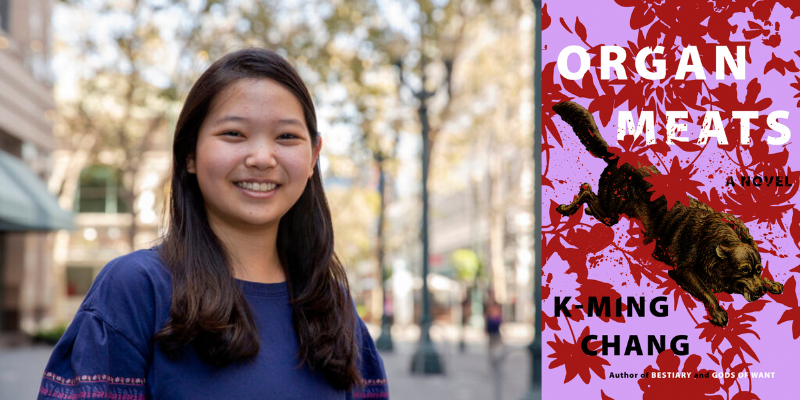
This week on The Maris Review, K-Ming Chang joins Maris Kreizman to discuss Organ Meats, out now from One World.
Subscribe and download the episode, wherever you get your podcasts.
*
from the episode:
Maris Kreizman: Your previous books are described as magical realism, but Organ Meats feels entirely surreal. I’m wondering if you could tell me about that. I often like to ask fiction writers about their constraints, and seemingly anything can happen in the world of your novel, but it’s only 266 pages, so you had to make some choices.
K-Ming Chang: Yeah, it’s funny because this is the most unconstrained out of my mythic triptych. I think a lot of the stories in Gods of Want were my exercise in constraint or having a very specific conceit that I was working within, and especially in that small form it was really helpful.
And then I feel like Organ Meats was like this extreme form of world building where every sentence contained its own world and every sentence felt like it was being pushed to its furthest point. It was almost like playing a relay race with myself, where every sentence was passing the baton off to the next sentence. But it was not around the lap, it was like someone climbing a tree, doing a flip in the sky, landing in a puddle, and then handing off the baton.
I was like, whoa, what happened to the trajectory here? But I think in some ways that was really fun. It was really deeply pleasurable. Maybe the constraint is more in the process of writing where I was thinking a lot about the sound of the language, the sonic qualities of the sentences, and having a kind of very sensory relationship to language, rather than an intellectual connection to the language. I think that helped shape where the book wanted to go and in what directions I should kind of continue excavating and delving.
MK: Absolutely, and I feel like your books are all very visceral, but this one really takes the cake. Tell me about writing that might not always be aimed at moving a plot forward.
KMC: Yeah, I can’t remember the poet who said it, but there’s a quote, I heard it from Victoria Chang at a panel, and she said, I’m interested in language first, then ideas. And I think that that’s what I’m kind of doing now, I’m experimenting with style and form and plot in a different way.
But when I was writing these books, and especially Organ Meats, it was very much about following the language first, letting it lead me, and kind of embracing a sense of mystery, and a sense of disorientation. I feel like we often talk about grounding the reader and kind of being sure to guide them through the narrative. And I believe in that deeply. There is kind of a thread here in the book. But I also feel like reading experiences that I gravitate toward the most, or that have most transformed me, are oftentimes experiences where I feel extremely disoriented and where I become kind of defamiliarized to things that I might otherwise see as mundane or natural or ordinary.
So I think rather than focusing on a linear plot, it was more like this tapestry, thinking of the thread motif throughout the book. Feeling like I’m creating something even if it’s just a fragment of something, kind of a greater quilt or landscape. Less thinking about progressing through that narrative and a little bit more of like, oh, what can we expand? What can we see in this horizon of language? And how might we guide the reader’s gaze to different points in this landscape, even if we’re moving side to side or moving backwards, not necessarily always moving forward in time.
MK: I love that because I do feel like this book is similar to poetry in that you just sort of have feelings wash over you. And of course, my first impulse, when meeting Anita and Rainey, the two main characters, was to look for facts about them, as if that was in any way your intention, or in any way the thing that I could do to appreciate this book the most.
KMC: Yeah, that’s really interesting. I feel like the more I talk about the collectives that surround the girls, thinking about character as relational, what are their roles, what kind of roles do they then use to inform their identity? How do they relate to the collective?
All of those questions form a more complete portrait of someone rather than thinking of them merely as individuals. They definitely are very idiosyncratic, these two girls have their idiosyncrasies for sure. They have their own kind of unique obsessions and desires, and in some ways they have to find a way to relate to their collectives or to their roles within a family while also honoring and paying tribute to their individual desires.
So that’s always kind of an interesting balance. But yeah, I find that I tend to first think about who are the people who came before them? Who are the women of their lineage? What are the conditions that have formed them? There are a lot of pearl motifs in this book. So I was thinking like, what is the oyster that they were pried from?
*
Recommended Reading:
Carmilla by Sheridan Le Fanu • Abyss by Pilar Quintana
__________________________________
K-Ming Chang is a Kundiman Fellow, a Lambda Literary Award finalist, and a National Book Foundation 5 Under 35 honoree. She is the author of the novel Bestiary, which was longlisted for the Center for Fiction First Novel Prize, the PEN/Faulkner Award, and the VCU Cabell First Novelist Award. Her new novel is called Organ Meats.
